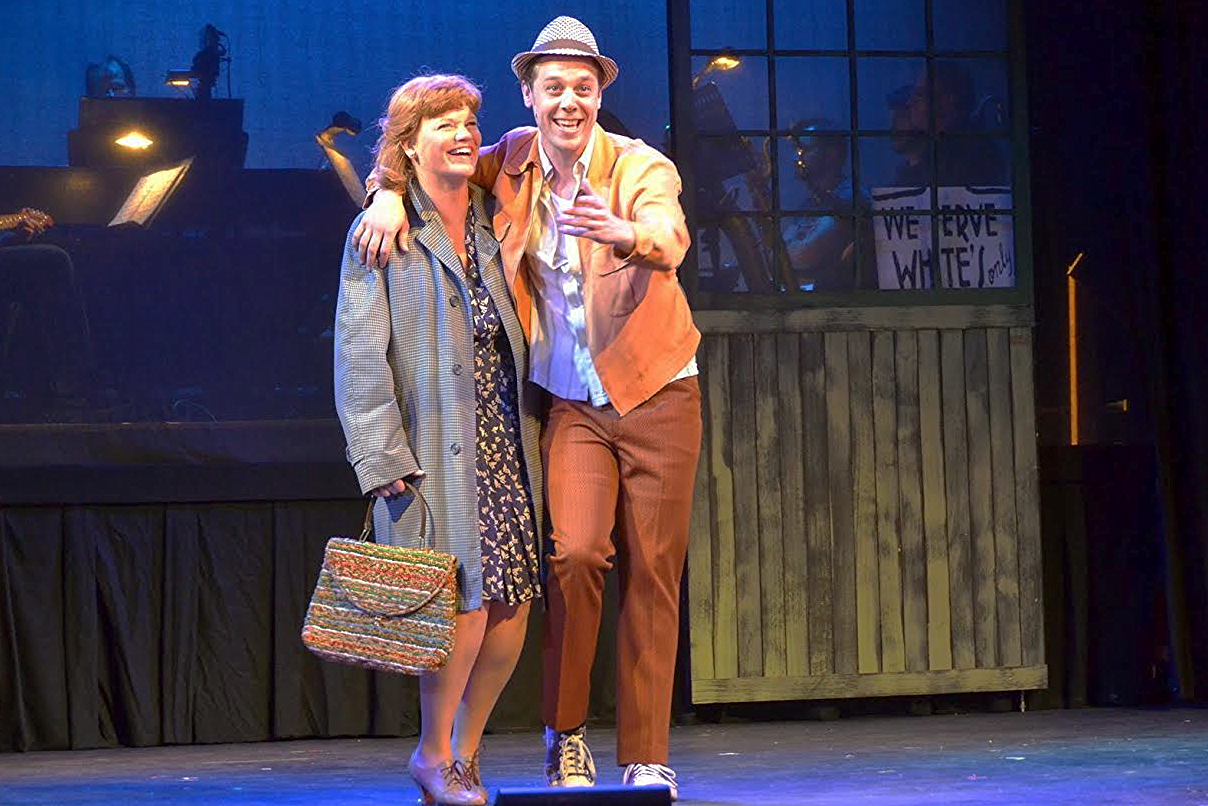Review of West Side Story, Ivoryton Playhouse
As a musical, West Side Story, with music by Leonard Bernstein, lyrics by Stephen Sondheim, book by Arthur Laurents from a conception by Jerome Robbins, and originally directed and choreographed by Jerome Robbins, has much to recommend it. Inspired in its plot by Romeo and Juliet, it’s got young love, tragedy, comic relief, numerous dance numbers and some lovely and lively songs. It’s about urban tensions between sparring gangs of different races, and, even at this remove from the “daddy-O”s of the 1950s, is able to express something of that perennial motivator, teen angst.
The Jets (photo: Jonathan Steele)
The production at Ivoryton this summer, directed and choreographed by Todd L. Underwood, with musical direction by Michael Morris, with many young performers yet to break into Equity, offers a passable version of the show. What it does best is showcase Stephen Mir as Tony, whose voice has a purity that helps to render the character’s sincere idealism, and Mia Pinero as Maria, a soprano able to make Maria seem angelic. Their best scene, and one of the high-points of the show, is the “balcony” number, “Tonight,” and they do well with “One Hand, One Heart” in the bridal shop, though their chemistry as lovers isn’t all it might be.
Maria (Mia Pinero), Tony (Stephen Mir) (photo: Jonathan Steele)
And that’s the main criticism I have for Underwood’s take on what should be a show of drama leavened by delight: the chemistry doesn’t quite jell. It’s missing in the comic number of Act One, “America,” and shines best in the ensemble reprise of “Tonight” just before the Act One close. The comic number of Act Two, “Gee, Officer Krupke” follows awkwardly on the lovely rendition of “Somewhere”—which features good vocals from Annelise Cepero as Francisca and Hillary Ekwall as Anybodys. The show’s flow seems impeded by the difficulty of making so many big dance numbers fit in a small space. The dancers, for the most part, keep the pace, with nice costumes to showcase their movements, but the success of each number seems to be based more on its logistics than on the performances per se.
In the supporting cast, Conor Robert Fallon as Riff is an asset whose loss for Act Two can only be mourned, and Natalie Madlon’s Anita helps carry the latter act with “A Boy Like That.” As Doc, George Lombardo adds a suitable maturity, and, among the Jets, Max Weinstein’s A-Rab and Colin Lee’s Action help maintain the intensity.
Francisca (Annelise Cepero), Anita (Natalie Madlon), Consuela (Arianne Meneses) (photo: Jonathan Steele)
The staging of the rumbles is impressive, and the quick changes of set props—such as Doc’s store—are efficient. The set itself, comprised of tall, tenement-like backdrops, helps to create a sense of the oppressive inner-city aspects of the story, though the space is a bit lacking in real urban feel—but for that fire escape for the “balcony” scene. Indeed, a curtained doorway for quick on-and-offs of the dancers seems oddly out of place in a back alley.
West Side Story is a great musical and it is important to give young performers a chance to work with its demands—which are considerable. Ivoryton should be commended for giving it a try on their stage. And, while the story of gangs at each other’s throats may have dated for a time, the policing of ethnicities and the bad rap for immigrants continues as a part of the darker side of the American Dream. West Side Story—as a tragedy—plays upon the way that good intentions can go awry, and offers a sobering look at how loyalty to one group often entails vicious hostility toward another group. That’s key to the drama of this musical and needs a strong presentation for the show to register its full effect. At Ivoryton, the show seems to be searching for its dominant tone.
West Side Story
Based on a Conception by Jerome Robbins
Book by Arthur Laurents
Music by Leonard Bernstein
Lyrics by Stephen Sondheim
Entire original production directed and choreographed by Jerome Robbins
Directed and choreographed by Todd L. Underwood
Musical Director: Michael Morris
Scenic Designer: Daniel Nischan; Stage Manager: Laura Lynne Knowles; Costume Designer: Elizabeth Cipollina; Lighting Designer: Marcus Abbott; Sound Designer: Tate R. Burmeister; Assistant Stage Manager: Megan Wilcox
Cast: Christian Álvarez, Victor Borjas, Annelise Cepero, Tom DiFeo, Hillary Ekwall, Conor Robert Fallon, Michael Hotkowski, Colin Lee, Taylor Lloyd, George Lombardo, Joey Lucherini, Amanda Lupacchino, Natalie Madlon, Rick Malone, Pierre Marais, Arianne Meneses, Daniel Miller, Stephen Mir, Mia Pinero, Alexa Racioppi, Jason Daniel Rath, Carolina Santos Read, Max Weinstein
Ivoryton Playhouse
July 5-July 30, 2017







